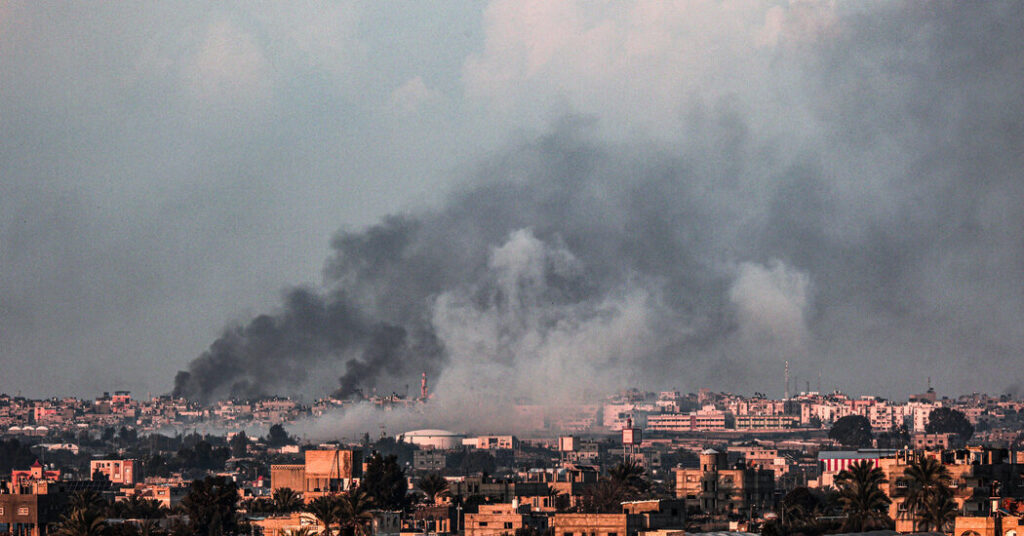[ad_1]
The largest medical facility still managing to function in wartime Gaza is now a hospital in little more than name only, the head of the World Health Organization said on Sunday.
After a week of siege by the Israeli military, there are only about 20 critically ill patients left at Nasser Hospital — but even that is too many for it to handle, said Tedros Adhanom Ghebreyesus, the W.H.O. director general.
“Nasser hospital in Gaza is not functional anymore,” Dr. Tedros said on social media.
Dr. Tedros said on Sunday that some 200 patients remained at the hospital in Khan Younis, in the southern Gaza Strip, and that about 20 of them urgently needed to be transferred elsewhere. “The cost of delays will be paid by patients’ lives,” he said.
Israel has justified its military actions at the hospital by saying that Hamas militants have been using it and other medical centers to conceal military activities, and on Sunday it said it had found both weapons and Hamas militants at the Nasser complex.
Hamas has repeatedly denied using hospitals as cover.
On Thursday, after days of repeated orders for the thousands of civilians taking shelter at the hospital to leave, Israeli forces began staging a raid.
Asked about the W.H.O. statement, a spokesman for the Israeli military, Lt. Col. Richard Hecht, said in a briefing that “it’s in our best interest that the hospital keeps functioning.” He said that work was being done to fix a broken generator there and that a temporary generator was in use.
But the Israeli military also said that its troops were continuing to deploy at Nasser hospital and in nearby areas, and that they had uncovered more weapons there.
Dr. Tedros said that W.H.O. workers who reached the hospital over the weekend had not been permitted to enter it to assess the conditions of the patients, but he said a fuel delivery was made to the medical facility.
His statement came a day after the Israel Prime minister, Benjamin Netanyahu, said that talks to reach a cease-fire and a deal for the release of the hostages taken in the Hamas-led Oct. 7 attack were at an impasse. Mr. Netanyahu said his government was pushing ahead with plans for a ground offensive in Rafah, in the southern Gaza Strip, despite mounting international warnings over the humanitarian cost.
With Israel under pressure to suspend its military assault in Gaza, begun after the Hamas-led cross-border attack in October, the Israeli cabinet met on Sunday and approved a resolution rejecting any attempts by the international community to impose a Palestinian state on Israel.
The action — largely symbolic — followed recent comments from some of Israel’s allies suggesting that they might consider simply recognizing a Palestinian state ahead of any agreement between Israel and the Palestinians.
Mr. Netanyahu, who brought the resolution to his cabinet, described its approval as a “declarative decision” that was needed “in light of remarks that have been heard recently in the international community.”
While the Biden administration has been trying to broker a deal for the normalization of ties between Israel and Saudi Arabia, American and Saudi officials have said that its prospects of success hinges on Israel’s agreeing to work toward a two-state solution — meaning the establishment of a Palestinian state alongside it.
Mr. Netanyahu has rebuffed recent pressure from President Biden to agree to that path after the war in Gaza is over, and in recent weeks doubled down on his opposition.
The final wording of the Israeli resolution approved on Sunday appeared to have been carefully crafted with the aim of accommodating both ultranationalist members of Mr. Netanyahu’s right-wing government, who oppose the very notion of negotiations with the Palestinians, and the centrists who joined the government after the war began.
The resolution did not explicitly rule out the possibility of Palestinian statehood, focusing instead on the process.
“Israel utterly rejects international diktats regarding a permanent settlement with the Palestinians,” it read, adding that “a settlement, if it is to be reached, will come about solely through direct negotiations between the parties, without preconditions.”
A Netanyahu rival who joined the war cabinet after the Hamas attack, Benny Gantz, echoed the prime minister’s remarks about an invasion of Rafah.
“The world must know, and Hamas leaders must know: If by Ramadan our hostages are not home, the fighting will continue to the Rafah area,” he said in a speech on Sunday. The holy month of fasting for Muslims is expected to begin on March 10.
Addressing concerns about the humanitarian toll, Mr. Gantz pledged that any military action would be done “in a coordinated manner, facilitating the evacuation of civilians” with the help of American and Egyptian officials.
More than a million Palestinians fled to Rafah and elsewhere in the south to escape the fighting in the north. Many ended up at Nasser Hospital seeking shelter, but left there last week as Israeli forces issued evacuation orders.
After the raid on the hospital, Israeli forces reported detaining “hundreds” of people, including some it said had taken part in the Oct. 7 attack. The Israeli military also said that it discovered weapons in the medical complex and evidence tied to the attack. One vehicle found there was from Nir Oz, an Israel kibbutz that was the scene of a massacre that day, the Israelis said.
It was not possible to independently verify either claim about the situation there.
On a visit to Israeli forces operating at the hospital, the chief of Israel’s southern command, Maj. Gen. Yaron Finkelman, described the raid there as a “precise, high-quality, focused operation.”
But on Sunday, the Palestinian Red Crescent said that Israeli shelling had struck another hospital in Gaza, Al-Amal, causing severe damage.
[ad_2]
Source link

